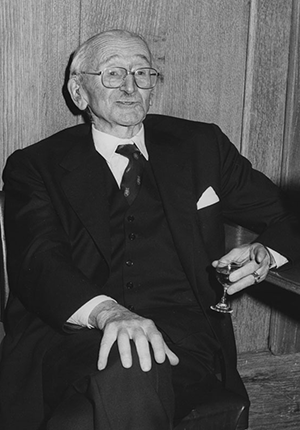Historic Document
Individualism and Economic Order (1948)
Friedrich A. von Hayek | 1948

Library of the London School of Economics and Political Science
Summary
Friedrich A. von Hayek (1899–1992) was one of the more prominent “Austrian School” economists, the libertarian, free-market scholars of economic thought that became widely known in the U.S. through Hayek’s work at The University of Chicago (1950-62). One of the more influential at spreading Austrian ideas throughout the English-speaking world, Hayek won the 1974 Nobel Prize in Economics. His sense of libertarian individualism had a tremendous impact on late-twentieth century American thought and policy.
Selected by

Christopher Brooks
Professor of History, East Stroudsburg University

Kenneth Mack
Lawrence D. Biele Professor of Law, Harvard Law School
Document Excerpt
What, then, are the essential characteristics of true individualism? The first thing that should be said is that it is primarily a theory of society, an attempt to understand the forces which determine the social life of man, and only in the second instance a set of political maxims derived from this view of society. This fact should by itself be sufficient to refute the silliest of the common misunderstandings: the belief that individualism postulates (or bases its arguments on the assumption of) the existence of isolated or self-contained individuals, instead of starting from men whose whole nature and character is determined by their existence in society. If that were true, it would indeed have nothing to contribute to our understanding of society. But its basic contention is quite a different one; it is that there is no other way toward an understanding of social phenomena but through our understanding of individual actions directed toward other people and guided by their expected behavior. This argument is directed primarily against the properly collectivist theories of society which pretend to be able directly to comprehend social wholes like society, etc., as entities sui generis which exist independently of the individuals which compose them. The next step in the individualistic analysis of society, however, is directed against the rationalistic pseudo-individualism which also leads to practical collectivism. It is the contention that, by tracing the combined effects of individual actions, we discover that many of the institutions on which human achievements rest have arisen and are functioning without a designing and directing mind; that, as Adam Ferguson expressed it, ‘nations stumble upon establishments, which are indeed the result of human action but not the result of human design’; and that the spontaneous collaboration of free men often creates things which are greater than their individual minds can ever fully comprehend. This is the great theme of Josiah Tucker and Adam Smith, of Adam Ferguson and Edmund Burke the great discovery of classical political economy which has become the basis of our understanding not only of economic life but of most truly social phenomena.
. . .
The chief concern of the great individualist writers was indeed to find a set of institutions by which man could be induced, by his own choice and from the motives which determined his ordinary conduct, to contribute as much as possible to the need of all others; and their discovery was that the system of private property did provide such inducements to a much greater extent than had yet been understood. They did not contend, however, that this system was incapable of further improvement and, still less, as another of the current distortions of their arguments will have it, that there existed a ‘natural harmony of interests’ irrespective of the positive institutions. They were more than merely aware of the conflicts of individual interests and stressed the necessity of ‘well-constructed institutions’ where the ‘rules and principles of contending interests and compromised advantages’ would reconcile conflicting interests without giving any one group power to make their views and interests always prevail over those of all others.




